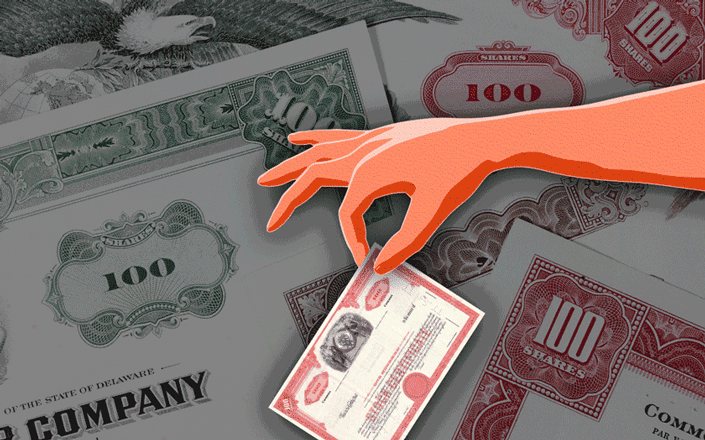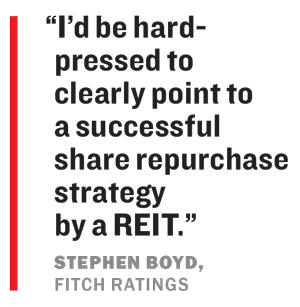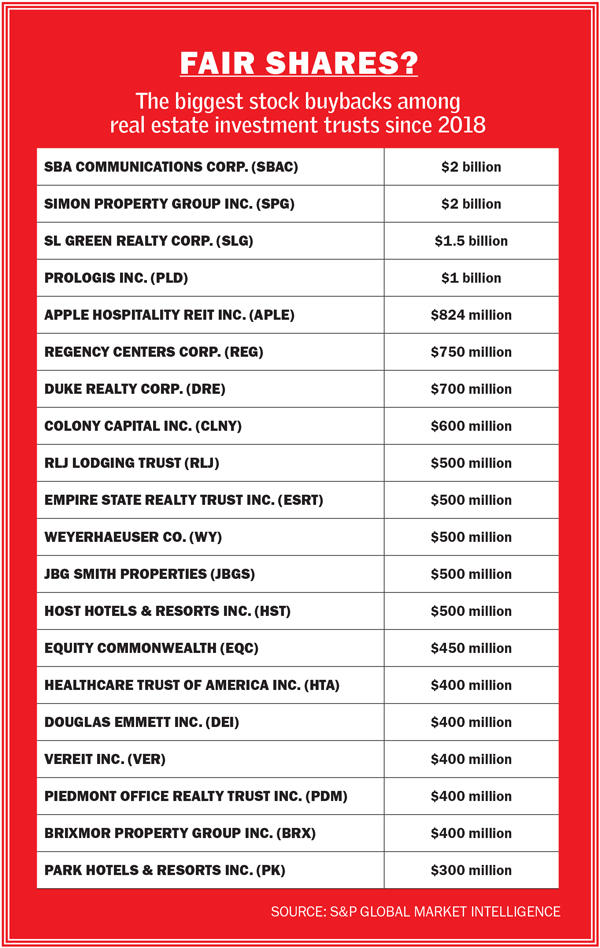Trending
Buyback blowback: REITs that repurchased stock now need cash
Publicly traded landlords may never see a positive return on stock buybacks if the naysayers are right

New York City’s largest office landlord has been hellbent on shrinking its portfolio over the past few years.
Instead of acquiring more buildings, SL Green Realty has sold properties and bought tens of millions of its own shares since initiating a $3 billion stock buyback three years ago. The publicly traded firm has repurchased so many shares, in fact, that its outstanding stock has been reduced by roughly a quarter since 2017.
And despite the city’s office market facing permanent shrinkage from Covid-19, there’s seemingly no end in sight to how far SL Green will go.
“It’s effectively a slow-motion liquidation,” said Piper Sandler analyst Alex Goldfarb, who covers SL Green and its REIT competitors. “I don’t think that’s expressly the plan. But at some point, the equity base becomes small enough that they could take the company private.”
A spokesperson for SL Green declined to comment.
SL Green’s buyback program is one of the most ambitious in commercial real estate — an industry that has struggled to raise its valuations on the stock market to match the premium prices that properties still command in the private realm.
But stock buybacks have long been a spot of controversy, criticized as some of the most short-sighted thinking on Wall Street, where companies are under immense pressure to prop up stock prices to meet quarterly goals.
And now that the pandemic has sent the national economy into recession, critics are arguing that tunnel vision is exacerbating the pain.
 “In the past three years, we have seen publicly traded corporations spend over $2 trillion on stock buybacks,” California Rep. Brad Sherman, a leading member of the House of Representatives’ Committee on Financial Services, said during a mid-July hearing as Congress mulled a coronavirus relief package.
“In the past three years, we have seen publicly traded corporations spend over $2 trillion on stock buybacks,” California Rep. Brad Sherman, a leading member of the House of Representatives’ Committee on Financial Services, said during a mid-July hearing as Congress mulled a coronavirus relief package.
“If this capital was in the hands of corporations, they would be better positioned to deal with the current downturn,” he said.
The impending talk of more bailouts has put further scrutiny on companies that have enriched their executives and investors by buying back stock during flush times and now have their hands out for financial assistance.
In the real estate realm, hard-hit sectors such as hospitality have asked for industry-specific bailouts. Some hotel companies have accepted assistance from the Paycheck Protection Program, and Congress is considering relief for struggling hotel and mall owners with CMBS debt.
What’s more, many real estate investment trusts continue to see their stock prices fall, bringing into stark relief that their buybacks have not worked.
“I’d be hard-pressed to think of an example where you can clearly point to a successful share repurchase strategy by a REIT,” said Stephen Boyd, a senior director at Fitch Ratings. “Especially when you get in a real market downturn like we have now, I think it’s not a good time to buy back stock.”
Buying low
In a wave of buybacks by public companies in recent years, real estate investment trusts have repurchased $19.5 billion worth of stock since 2018, according to figures from S&P Global Market Intelligence.
Part of the justification for repurchasing those shares was that the public companies were undervalued compared to what their real estate was worth. It was a REIT version of contrarian chest-thumping: Executives asserted that their best opportunity for robust returns — even better than investing in actual properties — was to invest in their own discounted stock.
But the pandemic and economic downturn have changed the equation.
Activist investor Michael Ashner said companies that need cash now to weather the pandemic are probably looking back and rethinking their decision to return capital to shareholders.
“It may have appeared to be wise to buy back stock prior to the end of the first quarter because your best investment may have been your own stock,” he said. “Hindsight being 20/20, it is not the case currently.”
Buying the stock when its price is low, the argument goes, pays off when the price begins to climb. The thing is, the long-awaited REIT bounceback hasn’t come. Instead, the coronavirus did.
 “A lot of companies have been buying back stock when that stock wasn’t a good deal,” said Gregory Milano, CEO of the financial consulting firm Fortuna Advisors. “If the naysayers are right and there really is potentially less demand for office space going forward, the share prices may never recover.”
“A lot of companies have been buying back stock when that stock wasn’t a good deal,” said Gregory Milano, CEO of the financial consulting firm Fortuna Advisors. “If the naysayers are right and there really is potentially less demand for office space going forward, the share prices may never recover.”
REIT stock prices have fallen nearly 12.5 percent this year, according to industry group Nareit’s company index. By comparison, the Nasdaq Composite is up nearly 23 percent and the Dow Jones Industrial Average is down about 2 percent.
To measure the success — or lack thereof — of buyback programs, Milano’s company examined the S&P 500 firms that most aggressively repurchased stock, ranking them across all sectors on the returns shareholders got.
Fortuna looked at 364 public companies, finding returns on investment as high as 46.9 percent (Nvidia — a technology company that makes chips for gaming consoles) and as poor as negative 32.2 percent (hydrocarbon company Diamondback Energy).
Among the real estate companies ranked was mall giant Simon Property Group, which has one of the industry’s largest approved buyback programs, with $2 billion worth of shares authorized to be repurchased since 2018. Simon investors endured a negative 1.7 percent return on investment between 2014 and 2019 from the buybacks, Fortuna calculated.
The company’s board approved a $2 billion repurchase plan in 2017 and another one last year. The company did repurchase some shares this year, but Simon executives paused when the pandemic hit, arguing it was time to be conservative.
“That’s not our primary focus right now,” CEO David Simon said on the company’s earnings call in May. “Getting the portfolio open, taking care of our employees, dealing with the retailers and the communities. That’s the primary focus.”
SL Green also appeared low on the ranking, with an ROI of negative 4.2 percent.
But unlike Simon, SL Green is running full steam ahead on its repurchase plan. After briefly hitting pause on buybacks in March, the office landlord raised $1 billion in capital by selling off assets and promptly reasserted its commitment to snapping up stock.
A spokesperson for SL Green declined to comment. But on the company’s most recent earnings call, in late July, CEO Marc Holliday said he believed that given the low price of its shares, once SL Green had enough cash to withstand the pandemic, it would keep selling assets and generating cash in other ways to fund buybacks.
The company, he said, will “continue share repurchases in the second half of this year and beyond.”
Compare that sentiment to one of SL Green’s major competitors, Vornado Realty Trust, which has refrained from buybacks.
CEO Steve Roth wrote in his annual chair’s letter in March that the company resisted pressure to repurchase its own stock, including when many argued it was undervalued three years ago.
“Even at the current stock price, our first priority is to protect the balance sheet,” Roth wrote.

Pros and cons
The most generous critics of stock buybacks say the capital could be put to better use reinvesting in companies and growing their business.
The harsher ones argue that buybacks are simply a way to temporarily boost the stock price — and executives’ bonuses — by reducing the number of shares on the market and thereby increasing earnings per share.
In this sense, they say, buybacks are nothing more than legal manipulation of the stock price.
But buybacks have supporters, too. They believe that institutional investors are better at allocating capital than companies are — particularly when it comes to moving it across sectors, like from industrials to tech.
And for REITs, some say it makes sense.
Michael Knott, head of REIT research at Green Street Advisors, said it is logical for REITs to buy back shares when the low stock price makes their cost of capital too expensive.
“The market is signaling that shrinking the portfolio through property sales is the right step,” he said. He added that companies could either use the proceeds to buy stock or retire debt, but the decision is less important than “following the signal and maintaining a healthy balance sheet.”
Not a good look
Apple Hospitality REIT, one of the country’s largest owners of hotels, with a market cap of $2.2 billion, has bought roughly 8.4 million of its own shares since 2018.
So it raised more than a few eyebrows when it scored $18 million from the federal Paycheck Protection Program in April and May.
The REIT disclosed in a regulatory filing in May that it returned the money after guidance from SBA and Treasury “related to the intended participants in this program” (for example, it was for businesses without other means of raising capital).
Apple Hospitality suspended its buyback program in March and has not restarted it. A spokesperson for the firm declined to comment.
But the issue of bailout money and stock buybacks has forged some strange bedfellows.
Rep. Alexandria Ocasio-Cortez this year criticized airline companies for looking for a federal handout after spending much of their profits buying back stock over the past decade.
“If there is so much as a DIME of corporate bailout money in the next relief package, it should include a reinstated ban on stock buybacks,” the Bronx and Queens representative tweeted in March.
President Donald Trump has long supported buybacks, but even he reeled at the idea of companies using bailout money to repurchase shares.
“I don’t want to give a bailout to a company and then have somebody go out and use that money to buy back stock in the company and raise the price and then get a bonus, OK?” he said during a news conference in March. “So I may be Republican, but I don’t like that.”
For many real estate companies, the issue now is whether to play defense or be opportunistic.
“For those REITs that are re-engaging in their repurchase programs, it tells me they’re having confidence that the real estate market is going to be robust,” said James Brau, a professor of finance at Brigham Young University’s business school who studies REITs. “If they are wrong, it wouldn’t be very sound management.”




